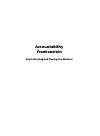
Accountability Frankenstein. Understanding and Taming the Monster PDF
Preview Accountability Frankenstein. Understanding and Taming the Monster
Accountability Frankenstein Understanding and Taming the Monster Accountability Frankenstein Understanding and Taming the Monster by Sherman Dorn University of South Florida IAP INFORMATION AGE P U B L I S H I N G Charlotte, North Carolina (cid:129) www.infoagepub.com Library of Congress Cataloging-in-Publication Data Dorn, Sherman. Accountability Frankenstein : understanding and taming the monster / by Sherman Dorn. p. cm. Includes bibliographical references. ISBN 978-1-59311-623-1 (pbk.) -- ISBN 978-1-59311-624-8 (hardcover) 1. Educational accountability--United States. 2. Education--Standards--United States. 3. Education--United States. I. Title. LB2806.22.D67 2007 379.1'58--dc22 2007006371 ISBN 13: 978-1-59311-623-1 (pbk.) ISBN 13: 978-1-59311-624-8 (hardcover) ISBN 10: 1-59311-623-3 (pbk.) ISBN 10: 1-59311-624-1 (hardcover) Copyright © 2007 IAP–Information Age Publishing, Inc. All rights reserved. No part of this publication may be reproduced, stored in a retrieval system, or transmitted, in any form or by any means, electronic, mechanical, photocopying, microfilming, recording or otherwise, without written permission from the publisher. Printed in the United States of America To Elizabeth Griffith, Kathryn Dorn, and Vincent Griffith—a teacher and two students as well as my much-loved family . CONTENTS Acknowledgments ix Preface xi 1. The Political Origins of Accountability 1 2. Trusting Tests 29 3. How Trustworthy are Test Scores? 59 4. Setting up Goals and Failure 87 5. Consequential Thinking 123 6. A Better Way 147 References 173 PREFACE ACKNOWLEDGMENTS Any professor owes a primary debt of gratitude to one’s own institutional colleagues. Several current and former colleagues at University of South Florida (USF) have encouraged me, written articles and edited books with me over the years, and given me specific suggestions on accountability over the years: Kathy Bradley-Klug, Kathy Borman, Deirdre Cobb-Rob- erts, Michael Curtis, Erwin V. Johanningmeier, Larry Johnson, Howard Johnston, Harold Keller, Mark Klisch, Sister Jerome Leavy, Reginald Lee, Deanna Michael, J. Lynn McBrien, Christine Ogren, Kelly Powell-Smith, Terry Richardson, Tomás Rodriguez, Barbara J. Shircliffe, Stephen Turner, Will Tyson, and Roy Weatherford. Several grants and other opportunities contributed to my under- standing of accountability in Florida. In 2001, the Spencer Foundation provided a grant to create the Consortium for Educational Research in Florida, and in 2004 the Educational Studies Policy Laboratory at Ari- zona State University sponsored a set of briefs on Florida reform, two of which I wrote. In each case, the support was crucial in giving me the time and capacity to think about my own state’s accountability system. Other scholars and fellow citizens who have contributed ideas in response to specific questions or have made helpful suggestions on drafts include Paul Bielawski, Gerald Bracey, Art Burke, Dan Butin, Leo Casey, Kathy Emery, David Figlio, Bob Hampel, Charlie Heath, James Horn, Heather Lewis, Kathryn McDermott, Monty Neill, Michael Resnick, Jane Robbins, A. G. Rud, Bob Schaeffer, Mary Ann Stank- iewicz, Stephen Turner, Wayne Urban, and Robert E. Wright. My mas- ter’s class in the fall of 2007 read a complete draft and gave invaluable feedback. David Berliner graciously shared a set of page proofs from ix x S. DORN Sharon Nichols and his Collateral Damage (2007) so that I could read it while revising my own manuscript. Several educators and public officials in Florida with different perspec- tives on accountability have provided insight over the years on account- ability, particularly Kathi Bateham, Tom Fisher, John Hilderbrand, Michael Monroe, Faye Pages, Gloria Pipkin, and Jerry Richardson. All of my children’s teachers have helped me ground my ideas in the reality of everyday teaching. My thinking about accountability as a focus of research began over a decade ago when I joined an e-mail list on education policy moderated by Gene V. Glass. As the founding editor of Education Policy Analysis Archives, Gene published two early articles on accountability, “The Political Legacy of School Accountability” (Education Policy Analysis Archives, 6(1), 1998, http://epaa.asu.edu/epaa/v6n1.html) and “America Y2K” (Education Policy Analysis Archives, 8(2), 2000, http://epaa.asu.edu/epaa/v8n2/), each of which has been cannibalized and passages rewritten for this book. He has continued to encourage my efforts over the years, including proposing this book to Information Age Publishers. Finally, I owe my family my gratitude for their love and support. My mother and late father raised me with the sense that education was a right and an obligation. My oldest sister Liz Parker has repeatedly educated me on the perspectives of a school board member. And to Elizabeth Marga- reta Griffith and our children, Kathryn Dorn and Vincent Griffith I owe the greatest debt for their insights and forbearance while this book took shape over 7 months.
